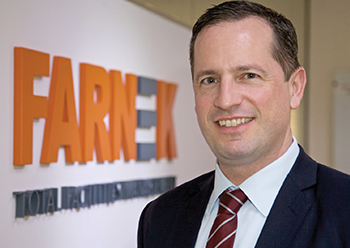Rethinking strategies for the new normal
MARKUS OBERLIN, CEO of Farnek, explains to Gulf Construction some of the significant developments he anticipates in the FM sector in response to the current Covid-19 crisis.
01 August 2020
Globally, every industry sector and business has been impacted by the Covid-19 crisis. We hear many industry commentators discuss the new normal; however, we do not know what that looks like or what effect it will have on us going forward.
We do know stakeholders across the business, health, and social spectrum will need to continue to work together until, and beyond, a vaccine has been found.
Taking a collaborative approach, we will need 100 per cent compliance with government regulations, which will lead to buildings – whether offices, warehouses, factories, construction sites, or public buildings – being used in a completely different way.
First of all, they will require a more advanced cleaning regime, stricter access controls, and lower occupancies to ensure distancing. In terms of cleaning and sanitisation, that means a higher frequency, particularly in public areas, which will increase the workload and, of course, revenues of soft facilities management (FM) providers. Mechanical, electrical and plumbing (MEP) services, such as air-conditioning and ventilation systems, will need to be adjusted and air ducts cleaned and disinfected more often.
However, service providers will also suffer – some companies are unlikely to survive this crisis, and landlords will be unable to employ regular cleaning and maintenance through the loss of service fees. The same might be said about residential properties as well, which will hit home maintenance companies.
Consequently, there will be further consolidation in the FM market, and only the more substantial well-capitalised total FM companies will survive this phase of economic adjustment in the market. Innovation, sustainability, and technology will continue to drive the market.
The installation of sanitisation tunnels outside of major buildings and facilities will be very much a part of the ‘new normal’. These tunnels will evolve as time goes by and will become even more sophisticated. I can foresee tunnels with multiple applications, from health to security being incorporated, certainly if this is considered a longer-term precaution.
The technology already exists for facial recognition cameras with automated temperature capture, something that Farnek has implemented at its head office and on-site. Utilising face recognition devices and implementing sanitisation tunnels would not have been considered four months ago. Now it has become common practice to walk through one when entering a mall, hotel, or leisure facility.
Technology will also be fundamental for improving indoor environments and making them even more efficient. High-efficiency air filters and automated disinfectant feeds into ventilation systems will become standard in most buildings, and in time these will likely become par for the course in building regulations.
Ultraviolet germicidal irradiation technology to disinfect and improve indoor air quality in buildings will also become standard practice. As such, facility managers will have an integral role in understanding the processes and implementing them.
High touchpoints, door handles, and light switches will, undoubtedly, be modified and upgraded with motion detectors where applicable or with magnetic ‘touch’ passes for more secure access points.
The same can be said for shared office equipment, particularly in public buildings and large offices. New weight restrictions will be posted into elevators, limiting the number of passengers, either through a people counter or reduced weight scale, which will sound an alarm, temporarily disabling the lift. These will become a standard-issue from a FM perspective.
There is an enormous opportunity for all companies operating in the FM sector to position themselves as a trusted business partner and not just an expense, but rather a single point of contact and full solution provider.
It will be vital for progressive FM companies to understand how the value chain of their customers work and where they can support their clients to comply with the evermore complex government regulations and guidelines and how they can operate most efficiently. This is not only to stay competitive in the market, but also to reassure all of their stakeholders that they are a competent, professional, and socially responsible organisation.
The other significant change that, I believe, will take place will be a 180-degree change in attitude towards soft FM operations, cleaning in particular. Cleaners will no longer have to be invisible. Having cleaners in full view of employees, visitors, and guests will promote confidence that the building is being regularly cleaned and sanitised thoroughly and professionally. Cleaning schedules should be highly visible, too, not just in bathrooms but in prominent public areas in buildings.
- Study sees busy year for sector
- Experts focus on the future for FM
- Rethinking strategies for the new normal
- Maintenance key to preventing failure
- Kärcher launches online support for cleaning
- Provis achieves key energy savings
- Eltizam unit nets over $201m FM contracts



